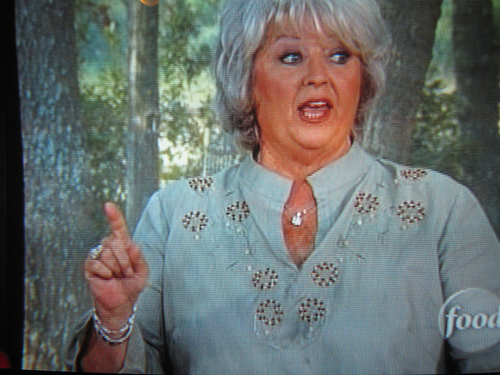The False Power of Racism
by Bina Shah / July 9, 2013 / 4 Comments
Racial epithets, ignorance, and control: From Paula Deen’s “Southern fried empire” to the UK and Pakistan.

Former Food Network star Paula Deen, whose racist remarks cost the TV personality her career. Photo: Flickr via alex.lines
I watched from faraway Pakistan these last few weeks as Paula Deen, queen of the Southern fried empire, lost it all for her racist sentiments—confessing that she used the “N-word” and that she had toyed with the idea of having a Southern plantation-themed party where “little” bow-tied black men would dress in white shirts and shorts to serve the (presumably all-white) guests. Her legal woes encompassed more than this, of course, when allegations of sexual harassment in her offices cropped up in court. Still, it was her racist tendencies that caused her sponsors and endorsements to drop her faster than a sack of sweet potatoes.

- Pakistan is a country of contradictions – full of promise for growth, modernity and progress, yet shrouded by political, social and cultural issues that undermine its quest for identity and integrity. My bi-monthly column “Pakistan Unveiled” presents stories that showcase the Pakistani struggle for freedom of expression, an end to censorship, and a more open and balanced society.

- Bina Shah is a Karachi-based journalist and fiction writer and has taught writing at the university level. She is the author of four novels and two collections of short stories. She is a columnist for two major English-language newspapers in Pakistan, The Dawn and The Express Tribune, and she has contributed to international newspapers including The Independent, The Guardian, and The International Herald Tribune. She is an alumnus of the International Writers Workshop (IWP 2011).
Racist epithets are odd, but even odder are the people who insist on their right to use them. I hear so many white people who complain: “Why can a black person use the word ‘n*gger’ and I can’t?” They also complain that black people call them words like “cracker” and “honkey,” and claim that this reverse racism justifies their being able to use the N-word. It strikes me that they are willfully ignorant of the fact that racism in the hands of those who hold the power in America, or another white majority society, is weighted very differently than racism hurled at a perceived oppressor from a minority. Certainly they have never thought about what it might be like to be a black person whose ancestors were owned by white people and who has to keep hearing a word that was used by slave owners against their entire race, all too often while they were being beaten, raped, or lynched.
As a Pakistani, I have a similar experience with another racial epithet that comes from the United Kingdom: “Paki.” Its implications are similar to the N-word in America. The Urban Dictionary explains it beautifully:
“A racist term that is often applied to people of Pakistani or South Asian descent. Its origins are commonly traced back to about 30 years ago [I’d say longer, since the 1950s and 60s], when British hooligans used the term Paki-bashing to refer to the gang beating of ethnic minorities.”
I’ve never been called “Paki” to my face, but I used to participate in an online chat room where some white people from different countries would racially abuse me with the word Paki. When I would protest, they’d disingenuously say, “Come on, Paki is just short for ‘Pakistani.’” We both knew better, though: The word “Paki” is never used innocently. It’s almost always tied to a phrase like “Paki go home,” or “Paki bastards,” racist chants that came about during the days of Enoch Powell and his fierce anti-immigration stance in 1960s Britain.
Pakis are smelly, Pakis eat curry, Pakis have skin the color of shit. Pakis get beaten up in the streets, spat on, and deserve to have shit and flaming rags shoved into their letterboxes. These are the common sentiments that surround the use of the word Paki, and all Pakistanis living in Britain know about the skinhead gangs that used to chase people of South Asian origin and beat them senseless on the streets. Is it any wonder that we bristle at the use of this word, even in ignorance, as when George Bush said it in 2002 while talking about the nuclear arms race between India and Pakistan?
So when I see people arguing about the N-word and saying that they should be allowed to use it, I have to shake my head ruefully and wonder whether they really are so ignorant about history, or whether they are just in denial about race relations in their own countries. And I have to wonder why people still want to cling to this word, or “Paki,” or any other epithet of that nature. Perhaps it remains a symbol that reminds them of days in which they had more power over these groups, and in the face of a world growing in multiculturalism and diversity, they simply can’t bear to let go.





4 Comments on "The False Power of Racism"
when i born to my mother i am free so i believe to freedom of expression
Thank you for writing this, Binah. I have read a lot of comments also from supportive racists about “reverse racism” their “confusion” is mere ignorance. They are the same voices who stood in long lines at Chik-Fil-A to support a prejudiced fast food mogul. My 14yo daughter said it best…the excuse that “it was a different time” does not apply as in other times there were people who ran the underground railroads, fought for abolition, and protected people in their homes. It would be the same as if she were in Germany being scorned for anti-semitic remarks and wanted to throw a Nazi themed party. She doesn’t get to justify it by saying it was a “different time”
I often say that whomever you are on the planet you are paying for a past that has everything to do with you yet nothing to do with you at the same time. For example, I was never a slave, but my life as an African-American is deeply affected by slavery. Even looking at George Zimmerman, he may have never owned slaves personally, however the racism slavery caused certainly influenced his choice to follow and ultimately shoot Trayvon Martin. The Good Men Project posted an EXCELLENT article concerning race that further addresses what we are discussing here. http://goodmenproject.com/ethics-values/why-i-dont-want-to-talk-about-race/
Everything is very open with a really clear description of
the issues. It was really informative. Your website is very helpful.
Thank you for sharing!